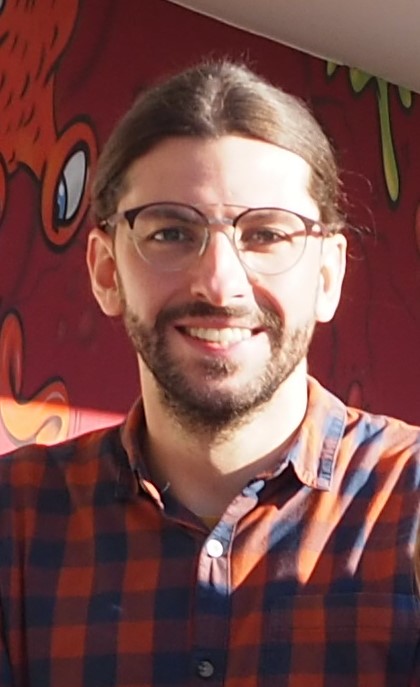Laboratoire d’Ingénierie des Systèmes Biologiques et Procédés (LISBP), Université de Toulouse, CNRS, INRA, INSA, Toulouse, France Neutral Genetic Drift-Based Engineering of a Sucrose-Utilizing Enzyme toward Glycodiversification ACS Catalysis, ACS Catal. 2019, 9, 2, 1241-1252 Daudé David, Alizée Vergès, Emmanuelle Cambon, Stéphane Emond, Samuel Tranier, Isabelle André, et Magali Remaud-Siméon
Cv
David Daudé, 33ans, diplômé depuis 2009 de l’Institut National des Sciences Appliquées (INSA) de Toulouse, a obtenu, en 2013, un Doctorat en Ingénieries Moléculaire et Enzymatique au sein du Laboratoire d’Ingénierie des Systèmes Biologiques et des Procédés (LISBP) de l’Université de Toulouse sous la direction de Prof. Magali Remaud-Siméon et de Dr. Isabelle André. Durant sa thèse, il étudie la promiscuité catalytique et l’évolution de l’amylosaccharase de Neisseria polysaccharea, une enzyme d’intérêt biotechnologique pour la synthèse de gluco-conjugués, d’oligo- et polysaccharides à hautes valeurs ajoutées à partir du saccharose, une ressource naturellement abondante. Il contribue à l’élaboration d’une stratégie d’évolution enzymatique originale, la dérive génétique neutre, pour modifier les propriétés de l’enzyme et met en évidence pour la première fois le potentiel de cette approche pour générer des biocatalyseurs présentant de nouvelles propriétés. Ce travail a abouti à la publication « Neutral Genetic Drift-Based Engineering of a Sucrose-Utilizing Enzyme toward Glycodiversification » dans ACS Catalysis et a bénéficié d'une mise en lumière dans les ACS Editor's Choice. David Daudé est actuellement Directeur Scientifique (CSO) de la société Gene&GreenTK, créée par le Prof. Éric Chabrière et le Dr. Mikael Elias au sein de l’Université Aix-Marseille, dont l’objectif est le développement d’enzymes extrêmophiles pour adresser des problématiques de santé publique et environnementale.
Contact
Dr. David Daudé
Chief Scientific and Operating Officer at Gene&GreenTK
IHU Méditerranée Infection
19-21 boulevard Jean Moulin
13005 Marseille
FRANCE
phone: (+33)626784214
website: www.gene-greentk.com
Résumé de l'article
Neutral drift (also called purifying selection) is an attractive approach to generate polymorphic variant libraries for enzyme engineering. Here, we have applied this strategy to modify the substrate specificity of a transglucosylase. Our model enzyme, the amylosucrase from Neisseria polysaccharea, is a glucosylation biocatalyst of prime interest because it uses the widespread substrate sucrose as a glucosyl donor and shows broad acceptor promiscuity. A library of 440 functional amylosucrase variants was generated after four rounds of neutral drift at a low mutation rate. The functional variations present in this library were investigated by assaying the ability of these variants to use an alternative glucosyl donor (p-nitrophenyl-α- D -glucopyranoside, pNP-Glc) and to glucosylate a range of acceptors (including methyl-α- L -rhamnopyranoside, which is not naturally recognized by the parental enzyme). The impact of these mutations on the thermal stability of the variants was also assessed. Large variations of acceptor promiscuity were observed, ranging from the complete loss of detectable activity to a 2-fold increase relative to the parental enzyme. Variants showing increased catalytic efficiency toward the alternative pNP-Glc donor were also identified. Specifically, one variant combining four unprecedented amino acid changes was 25-fold more efficient at utilizing pNP-Glc than the parental enzyme and acquired glucosylation activity toward methyl-α- L -rhamnopyranoside. Enzymes with improved thermal stability were also identified. Overall, our work demonstrates that neutral drift is an effective and powerful strategy to engineer transglycosylases with enhanced or even acquired substrate specificities from small-sized functional libraries compatible with accurate low-throughput multi-parameter analyses.




